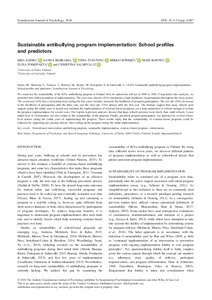Sustainable antibullying program implementation: School profiles and predictors
Sainio M.; Salmivalli C.; Herkama S.; Poskiparta E.; Rönkkö M.; Kontio M.; Turunen T.
https://urn.fi/URN:NBN:fi-fe2021042827240
Tiivistelmä
We examined the sustainability of the KiVa antibullying program in Finland from its nationwide roll‐out in 2009 to 2016. Using latent class analyses, we identified four different patterns of implementation. The persistent schools (43%) maintained a high likelihood of participation throughout the study period. The awakened (14%) had a decreasing trend during the first years, but then increased the likelihood of program participation. The tail‐offs (20%) decreased in the likelihood of participating after the third year, and the drop‐offs (23%) already after the first year. The findings suggest that many schools need support during the initial years to launch and maintain the implementation of evidence‐based programs; yet a large proportion of schools manage to sustain the program implementation for several years. The logistic regression analyses showed that large schools persisted more likely than small schools. Lower initial level of victimization was also related to the sustainability of the program. Finally, persistent program participation was predicted by several school‐level actions during the initial years of implementing the program. These results imply that the sustainability of evidence‐based programs could be enhanced by supporting and guiding schools when setting up the program during the initial implementation.
Kokoelmat
- Rinnakkaistallenteet [19207]
